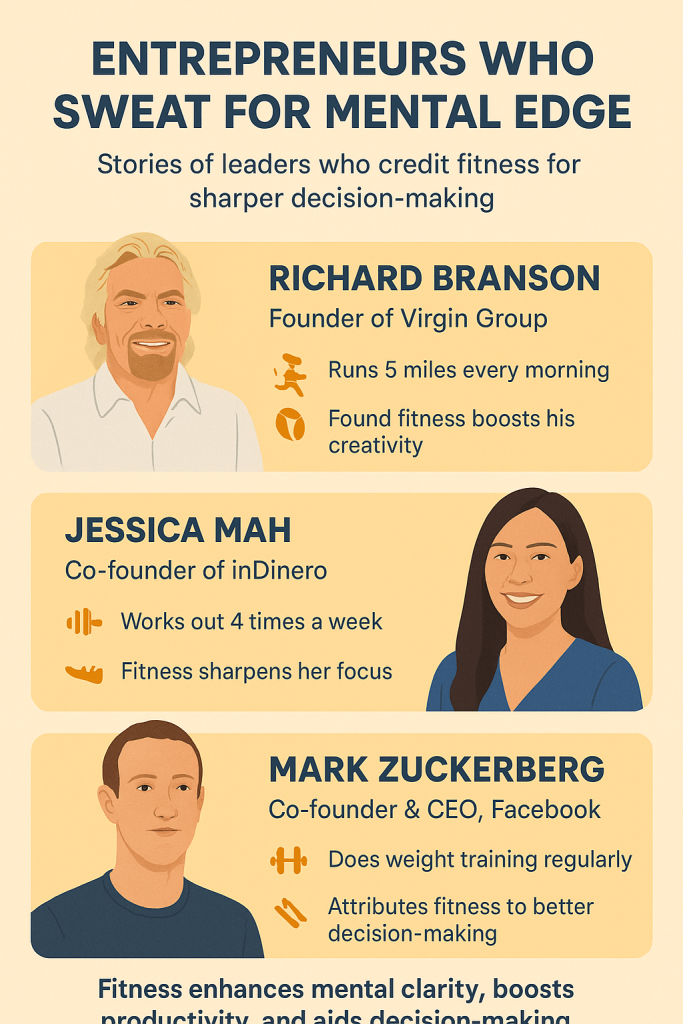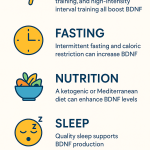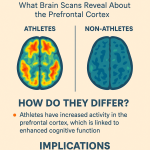Entrepreneurs Who Sweat for Mental Edge
Entrepreneurs who sweat for mental edge are proving that fitness is more than just a lifestyle choice—it’s a competitive advantage. In the fast-paced world of business, where decisions shape millions of dollars and innovation requires laser focus, many leaders credit their sharp thinking, resilience, and creativity to daily workouts. Fitness for entrepreneurs isn’t just about looking good—it’s about thinking clearly, solving problems effectively, and maintaining emotional stability under pressure.
From running marathons to hitting the gym before board meetings, countless successful business leaders have shown that breaking a sweat can strengthen more than just muscles—it can rewire the brain for sharper decision-making. In this blog, we’ll explore inspiring stories, science-backed studies, and practical strategies that show how entrepreneurs are harnessing fitness for business success.
Why Fitness Matters for Entrepreneurs
Running a business is mentally taxing. Stress, decision fatigue, and long hours take their toll. Studies show that exercise improves cognitive performance, reduces anxiety, and enhances executive function—all crucial traits for business leaders.
- Sharper Decision-Making: A study from the British Journal of Sports Medicine found that aerobic exercise significantly improves brain plasticity and executive functioning. This means faster problem-solving and better adaptability—exactly what entrepreneurs need.
- Stress Management: The American Psychological Association reports that exercise is one of the most effective ways to combat stress by lowering cortisol levels.
- Boosted Creativity: Research published in Frontiers in Psychology shows that walking and aerobic activity enhance divergent thinking, the mental process behind creative ideas.
For entrepreneurs, where innovation and resilience are survival tools, fitness becomes a non-negotiable part of the toolkit.
The Science: Exercise and the Entrepreneurial Brain
Entrepreneurs who sweat for mental edge benefit from profound neurological shifts:
- Neurogenesis and BDNF (Brain-Derived Neurotrophic Factor): Exercise stimulates BDNF, which fosters new brain cell growth and strengthens neural connections. This leads to sharper memory and learning capacity—crucial for leaders constantly processing new information.
- Prefrontal Cortex Activation: This brain region is responsible for decision-making, impulse control, and strategic thinking. Regular exercise increases blood flow here, sharpening focus and reducing impulsive mistakes.
- Emotional Regulation: Exercise balances neurotransmitters like serotonin and dopamine, which help regulate mood and motivation. Entrepreneurs who exercise report higher emotional resilience, especially under stress.
A landmark study from Harvard Medical School highlights that even 30 minutes of moderate activity a day can lead to noticeable improvements in mental clarity and long-term brain health.
Case Studies: Entrepreneurs Who Sweat for Mental Edge
1. Richard Branson – Fitness as Fuel for Innovation
Richard Branson, founder of Virgin Group, openly credits his success to his commitment to fitness. A passionate kitesurfer, cyclist, and tennis player, Branson has said, “I definitely can achieve twice as much by keeping fit.” His high-energy lifestyle not only fuels creativity but also helps him handle the immense stress of managing hundreds of companies.
2. Mark Cuban – Early Morning Workouts for Sharpness
Billionaire entrepreneur and investor Mark Cuban starts his mornings with at least an hour of cardio and weight training. He insists this discipline helps him maintain sharpness in high-stakes negotiations and decision-making on shows like Shark Tank. Cuban has admitted that if he doesn’t work out, he feels mentally sluggish.
3. Arianna Huffington – Sleep and Fitness for Clear Thinking
Founder of the Huffington Post and Thrive Global, Arianna Huffington combines sleep hygiene with regular yoga and meditation. She emphasizes that fitness isn’t just physical but also includes restorative practices. For her, movement sharpens creativity and aligns with her mission to reduce burnout in entrepreneurs.
4. Jack Dorsey – Running for Focus
Twitter and Square co-founder Jack Dorsey has often spoken about how running provides him with mental clarity. His routine of long-distance running doubles as meditation, helping him process complex decisions and innovate in the fast-changing tech world.
5. Oprah Winfrey – Strength in Consistency
Oprah incorporates cardio, strength training, and meditation into her lifestyle. She credits her consistent fitness routine with grounding her during intense business phases. For her, fitness is a mental sanctuary that fuels sharper leadership.
6. Mark Zuckerberg – Daily Exercise for Discipline
Meta founder Mark Zuckerberg set a personal challenge to run a mile every day. He shared publicly that staying active not only gives him energy but also teaches discipline—an essential skill for long-term leadership.
7. Sara Blakely – Fitness for Confidence and Energy
The billionaire founder of Spanx incorporates yoga and running into her daily life. She says exercise fuels her confidence, giving her the energy to navigate challenges and lead her company with resilience.
Fitness and Decision-Making: The Hidden Connection
Entrepreneurs must make dozens of decisions daily—from financial calls to hiring talent. Exercise influences decision-making in three key ways:
- Reduced Decision Fatigue: Physical activity replenishes mental energy, allowing entrepreneurs to make sharper choices later in the day.
- Improved Risk Assessment: Research in Cognitive, Affective, & Behavioral Neuroscience shows that aerobic exercise enhances the ability to evaluate risks and rewards—critical in entrepreneurship.
- Faster Information Processing: Exercise boosts working memory, which helps leaders quickly analyze data and make informed decisions.
Fitness as a Competitive Advantage
In an era where markets shift rapidly, entrepreneurs who sweat for mental edge gain a competitive advantage:
- Consistency in Leadership: A fit body sustains a fit mind. Entrepreneurs who prioritize workouts maintain steadier energy and clearer thinking throughout the day.
- Networking Through Fitness: Many entrepreneurs connect with peers during sports or charity runs, creating business opportunities in unexpected ways.
- Brand Authenticity: Leaders who embrace fitness often inspire their teams and customers, building credibility around discipline and resilience.
Studies That Back It Up
- University of British Columbia: Found that regular aerobic exercise boosts the hippocampus, improving memory and learning.
- Stanford University Study: Walking increased creative output by up to 60%.
- Journal of Occupational and Environmental Medicine: Employees who exercised regularly had 15% higher performance levels and lower stress markers.
These findings confirm what entrepreneurs have experienced firsthand: fitness directly translates to improved professional performance.
Practical Strategies: How Entrepreneurs Can Sweat for Mental Edge
1. Morning Routines That Prime the Brain
Start the day with exercise to boost dopamine and serotonin. Morning workouts align with circadian rhythms and set a productive tone.
2. Micro Workouts During Workday
Busy schedule? Even short 10-minute workouts between meetings can sharpen focus. Consider bodyweight exercises, jump rope, or a quick jog.
3. Mind-Body Fitness
Yoga, tai chi, and martial arts not only build strength but also improve mindfulness, helping entrepreneurs stay grounded.
4. Cold Showers and Recovery
Recovery practices like cold showers, sauna, and stretching enhance resilience and support the nervous system.
5. Tracking Progress
Entrepreneurs thrive on metrics—so track workouts with apps or wearables to maintain accountability.
Balancing Fitness with Business Demands
While fitness is powerful, entrepreneurs must avoid burnout. Strategies include:
- Scheduling Workouts as Meetings: Treat exercise as a non-negotiable calendar entry.
- Prioritizing Sleep: Fitness benefits compound when combined with quality sleep.
- Nutrition for the Brain: A balanced diet (omega-3s, antioxidants, protein) enhances exercise effects.
- Delegating Tasks: Protect time for fitness by outsourcing non-essential work.
Stories of Startups Embracing Fitness Culture
- Google: Famous for providing gyms and wellness programs that encourage employees to stay active.
- Nike: Their work culture integrates sport into daily routines, reinforcing brand authenticity.
- Smaller Startups: Many co-working spaces now integrate fitness classes, recognizing the productivity benefits.
Entrepreneurs are increasingly building fitness into company culture, not just personal routines.
The Future: Fitness as Part of Entrepreneurial Education
Business schools and incubators are beginning to include wellness programs for founders. Mental resilience training, meditation sessions, and exercise challenges are being recognized as equally important as finance or marketing courses. The future entrepreneur will be as focused on fitness as on fundraising.
Infographic: Fitness and Mental Edge for Entrepreneurs
Title: Why Entrepreneurs Who Sweat Make Better Leaders
- 30 min exercise = 30% improvement in focus (Harvard)
- 60% increase in creativity after walking (Stanford)
- 15% higher performance in active employees (JOEM)
- Top entrepreneurs who credit fitness: Branson, Cuban, Huffington, Dorsey, Zuckerberg, Blakely
Conclusion: Sweat as a Superpower for Entrepreneurs
Entrepreneurs who sweat for mental edge understand a powerful truth: success isn’t just about strategy or funding—it’s about the state of mind. Fitness fuels focus, resilience, and creativity, enabling leaders to handle stress, make sharper decisions, and
What Japanese Brain-Scan Research Reveals About Gymnast Neuroplasticity
An illuminating study reported by The Asahi Shimbun reinforces this deep dive into neuroplastic changes in Olympic-level gymnasts—which aligns perfectly with our core topic.
Researchers led by Hidefumi Waki at Juntendo University conducted MRI scans on 10 male gymnasts with world-class credentials and compared them to a control group of non-athlete males. Strikingly, certain regions of the gymnasts’ cortex were about 10% larger—notably the precentral gyrus (motor function) and the inferior parietal lobule (involved in spatial perception and sensory integration) 朝日新聞.
Furthermore, the team discovered that athletes with higher average competition scores tended to have larger volumes in the inferior parietal lobule, suggesting that long-term training reshapes brain regions tied to spatial and sensory processing 朝日新聞. Interestingly, no regions were found to be smaller, underscoring that these adaptations appear to be built—not traded off.
Waki notes that gymnasts’ ability to make split-second body adjustments—even before initiating movement—is central to their expertise 朝日新聞. These insights dovetail with our discussion on prefrontal recalibration, motor-visual integration, and the emergence of autopilot-like performance in elite athletes.
Shaolin monks brain scan research not only highlights incredible focus and resilience but also connects deeply to modern health and wellness practices. Their disciplined lifestyle—balancing meditation, movement, and mindfulness—shows us how ancient wisdom aligns with today’s science-backed approaches to stress management, emotional regulation, and overall well-being.



